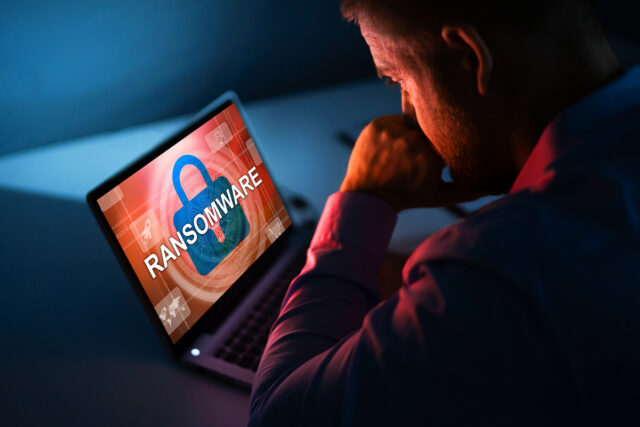
Ransomware is not just a “virus.” It is a highly lucrative business model used by nefarious actors in cyberspace to engage in modern-day piracy on the high seas of the internet.
1. Is cloud storage safe from ransomware?

As much as you might believe otherwise, cloud services are not immune from ransomware.
In July 2024, Blackbaud, a leading cloud storage service provider suffered from a major ransomware attack leading to data breaches. The company had no option but to pay ransom to recover their data. The malicious actors’ encrypted entire data on the company’s data centers and in the process of doing so, stole a major chunk of it.
The company was constantly threatened to pay a ransom or risk getting the data published on the dark web.
2. Is an investment in private cloud servers worth your money?
Since cloud storage automatically syncs your local disk data to the cloud, in a case of a ransomware attack, your local files will get encrypted, eventually destroying your data in the cloud.
Cloud services such as Azure, AWS, Google Cloud are definitely a step in the right direction for small to medium-sized businesses but they should not be relied on to keep your data safe.
While cloud storage data is much safer than locally stored data, it is all about timing. The sooner you notice a ransomware attack, the sooner you disconnect cloud storage. Once your entire data gets encrypted, you can easily restore the files
Knowing that the vast majority of ransomware incidents occur with the help of a significant amount of human intelligence, it helps us to better understand how to protect our networks and prevent a very uncomfortable situation.
There was a time when gold coins and banknotes were considered valuable. Today, that same currency is data. Tech giants such as Facebook, Microsoft, Amazon, and Google store, and process billions of files on a daily basis, which is something hackers are currently eyeing on.
3. Why are hackers targeting cloud storage service providers?

Ransomware, as discussed previously, doesn’t take place overnight. Rather, it takes weeks if not days of sheer planning and execution to stage a perfect attack.
Even more dangerous is that ransomware can go undetected for a long period of time until files are encrypted, and problems are found.
While relying on local backups is a good option, it is still not as viable as cloud storage. You never know when your local backup drives, connected with the network, are also encrypted with the virus.
There are a number of reasons why hackers are now tapping the previously untapped, highly “profitable” enterprise cloud services providers.
4. Cloud service providers – a lucrative target for hackers
For starters, malicious actors never made cloud service providers their prime targets. They were hitting anyone and everyone using a shotgun approach. Today, they are narrowing down their targeting options, and specifically choosing high-end companies and enterprises to make windfall profits.
A decade ago, the cloud was just seen as a way to backup your data. Today, almost all companies big or small rely on cloud deployments to streamline and access their data. These businesses would go bankrupt if they lose access to their private cloud servers.
For governments or enterprises, restoring their private data is just as necessary as storing data from local hard drives, due to which most of them end up paying hefty ransom amounts.
What else are hackers after?
But it isn’t just money that hackers are looking at. When ransomware hits a company, it encrypts the entire network of only that organization. Imagine a single Google server or an Amazon Web Server being locked up, containing data of hundreds, if not thousands of organizations.
Companies relying on that one server would all be faced with a ransomware attack. That one attack is equivalent to an attack on all companies.
This is usually how Sodinokibi and GandCrab ransomware variants have mostly spread in the first half of 2019, by leveraging entry points of managed service providers.
How can cloud security help prevent ransomware attacks?

While cloud services have made it easier than ever for companies to smartly deploy their data, it isn’t enough to secure it.
The good news is that a number of cloud security providers are providing basic security protocols such as the latest anti-virus and anti-malware programs backed with 24 hours of continuous monitoring by server experts to notice any suspicious activity
But as the network is hardened, so are the hackers making sophisticated ransomware attacks, bypassing all anti-virus programs.
Then why is a private cloud server the ultimate answer?
Setting up a private cloud server is important to maintain its long term security. Using free software and little to no protection measures will often lead to disastrous results in the future. It is important that no weak spots are left in creating the private cloud server.
For example, giving everyone the same file permission access is not an ideal way to get the work done. Rather, companies need to provide file sharing access based on their account type. Not every employee needs admin access to every folder. And once the work is done, file sharing should be turned off.
Concluding thoughts

While a private cloud network like Azure, Google Cloud, and AWS isn’t 100% safe from ransomware attacks, they still have a higher success rate than traditional backups!
Use strong passwords and enable 2 Factor Authentication. Also, make sure that remote access is only turned on when required. It is important to rope in a cybersecurity company like BeforeCrypt to help with a comprehensive cybersecurity policy and plan when setting up a private cloud server.







